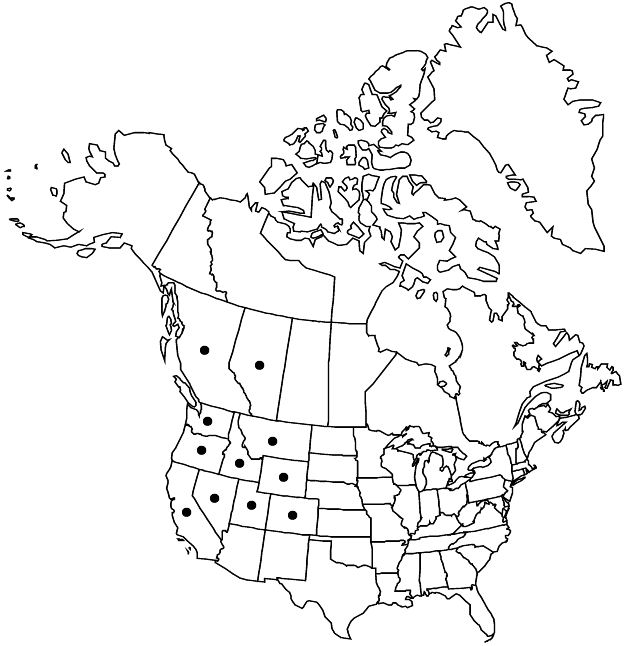Viola praemorsa
Edwards’s Bot. Reg. 15: plate 1254. 1829.
Plants perennial, caulescent, not stoloniferous, 5.5–36.5 cm. Stems 1–3 (–5), prostrate, decumbent, or erect, leafy proximally and distally, glabrous or puberulent, on caudex from usually vertical, subligneous rhizome. Leaves basal and cauline; basal: 1–5; stipules adnate to proximal 1/3 of petiole, forming 2 narrow, linearlanceolate wings, margins entire, apex of each wing free, acute; petiole 2.6–19.2 cm, glabrous or densely puberulent; blade usually elliptic to ovate, sometimes oblong-lanceolate to ± orbiculate, 1.7–14 (–17) × 0.8–5.3 (–6.7) cm, base attenuate to ± truncate or subcordate, often oblique, margins usually crenate, serrulate, or serrate, sometimes entire, ciliate or eciliate, apex acute to obtuse, surfaces glabrous or densely puberulent; cauline similar to basal except: stipules lanceolate to ovate, margins entire or toothed, with or without gland-tipped projections, apex acute to acuminate; petiole 1.3–16.2 cm, glabrous or puberulent; blade 2.3–11 (–14.8) × 1.1–3.6 (–5.5) cm, length 1.1–6.5 times width. Peduncles 4.4–27 cm, glabrous or puberulent. Flowers: sepals lanceolate, margins eciliate, auricles 1–2 mm; petals deep lemon-yellow adaxially, upper 2, and sometimes lateral 2, brownish purple abaxially, lower 3 brownish purple-veined, lateral 2 sparsely bearded, lowest 11–19 mm, spur yellow or pale green, gibbous, 0.5–3 mm; style head bearded; cleistogamous flowers axillary. Capsules ellipsoid to oblong, 6–14 mm, glabrous or finely puberulent. Seeds medium to dark-brown or redbrown, 2–3 mm, elaiosome completely covering funiculus. 2n = 36, 48.
Distribution

Alta., B.C., Calif., Colo., Idaho, Mont., Nev., Oreg., Utah, Wash., Wyo.
Discussion
Varieties 3 (3 in the flora).
Viola praemorsa is a complex group that appears to be evolving. Sympatric populations and the similarity of their flowers provide opportunities for hybridization and introgression (D. M. Fabijan et al. 1987). Some botanists have suggested that all taxa in the V. nuttallii complex, which includes V. bakeri, V. nuttallii, V. praemorsa, V. tomentosa, and V. vallicola, should be treated as varieties of V. nuttallii, as C. L. Hitchcock et al. (1955–1969, vol. 3) did, on the basis that these taxa are more or less sympatric in range, intergrade with one another, and possess no distinctive gross morphological features by which they can be consistently recognized. S. L. Welsh et al. (1987) treated V. praemorsa and V. linguaefolia Nuttall as synonymous with V. nuttallii, stating that V. nuttallii (and related taxa) are acaulescent to short-caulescent. Although some plants have short internodes, all plants in the V. nuttallii complex are caulescent. We acknowledge the complexity and taxonomic difficulties inherent in the V. nuttallii complex; patterns of morphology, cytology, and leaf flavonoid chemistry provide a basis for recognizing infrataxa. Fabijan et al. conducted the most extensive study of the complex to date; their treatment of V. praemorsa is followed here.
Selected References
None.
Lower Taxa
Key
| 1 | Basal and cauline leaf blade bases ± truncate to subcordate; basal leaf blades 1.7–5.9(–7.3) cm, length 1.1–3 times width; plants 5.5–21.5 cm. | Viola praemorsa var. praemorsa |
| 1 | Basal and cauline leaf blade bases attenuate; basal leaf blades 2.7–17 cm, length 1.7–6.5 times width; plants 10.5–36.5 cm | > 2 |
| 2 | Basal leaf blades (3.4–)5.3–17 cm, usually ovate to elliptic, sometimes oblong-lanceolate, length 1.8–6.5 times width; peduncles 5.9–27 cm. | Viola praemorsa var. flavovirens |
| 2 | Basal leaf blades 2.7–8.5 cm, usually ovate to elliptic, sometimes oblong-lanceolate, length 1.7–3.4 times width; peduncles 5–15 cm. | Viola praemorsa var. linguifolia |
"thick" is not a number. "narrow" is not a number.